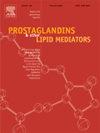Beta-sitosterol regulates PTGS1 to inhibit gastric cancer cell proliferation and angiogenesis
IF 2.5
3区 生物学
Q3 BIOCHEMISTRY & MOLECULAR BIOLOGY
Prostaglandins & other lipid mediators
Pub Date : 2025-01-24
DOI:10.1016/j.prostaglandins.2025.106964
引用次数: 0
Abstract
Background
Gastric cancer (GC) is the third leading culprit of cancer-related deaths around the world. Beta-sitosterol (BS) is an important phytosterol that has been proven to have anti-proliferative effects on GC and other tumors. However, mechanisms and targets of BS in cancer are rarely explored.
Methods
In this investigation, the targets of BS in the treatment of GC were analyzed by network pharmacology. Molecular docking and cellular thermal shift assay were introduced to validate the binding relationship between BS and PTGS1. The impacts of BS on GC cell viability, half maximal inhibitory concentration, proliferation ability, apoptosis level, and angiogenesis ability were detected by using Cell Counting Kit-8, clone formation assay, flow cytometry, and angiogenesis experiment, respectively. In addition, the expression levels of angiogenic factors (VEGF, FGF, PAI-1) were detected by using western blot.
Results
In this project, through cell experiments, PTGS1 was identified as a protein that directly binds to BS. In vitro cell experiments revealed that BS promoted apoptosis and inhibited GC cell proliferation and angiogenesis. Importantly, treatment with BS attenuated the promoting influence of PTGS1 overexpression on GC cell proliferation and angiogenesis.
Conclusion
This investigation highlighted PTGS1 as the target of BS in GC cells. BS can regulate PTGS1 to inhibit GC cell proliferation and angiogenesis, providing new evidence for the potential use of BS as a therapeutic agent for GC.
谷甾醇调节PTGS1抑制胃癌细胞增殖和血管生成。
背景:胃癌(GC)是全球癌症相关死亡的第三大元凶。谷甾醇(BS)是一种重要的植物甾醇,已被证明对胃癌和其他肿瘤具有抗增殖作用。然而,BS在癌症中的作用机制和靶点却很少被探索。方法:采用网络药理学方法对BS治疗GC的作用靶点进行分析。通过分子对接和细胞热移实验验证了BS与PTGS1的结合关系。通过细胞计数试剂盒-8、克隆形成实验、流式细胞术和血管生成实验分别检测BS对胃癌细胞活力、半最大抑制浓度、增殖能力、凋亡水平和血管生成能力的影响。western blot检测血管生成因子(VEGF、FGF、PAI-1)的表达水平。结果:本项目通过细胞实验,鉴定出PTGS1是一种直接结合BS的蛋白。体外细胞实验显示,BS促进胃癌细胞凋亡,抑制胃癌细胞增殖和血管生成。重要的是,BS治疗减弱了PTGS1过表达对GC细胞增殖和血管生成的促进作用。结论:本研究表明PTGS1是GC细胞BS的靶点。BS可调节PTGS1抑制胃癌细胞增殖和血管生成,为BS作为胃癌治疗剂的潜在应用提供了新的证据。
本文章由计算机程序翻译,如有差异,请以英文原文为准。
求助全文
约1分钟内获得全文
求助全文
来源期刊

Prostaglandins & other lipid mediators
生物-生化与分子生物学
CiteScore
5.80
自引率
3.40%
发文量
49
审稿时长
2 months
期刊介绍:
Prostaglandins & Other Lipid Mediators is the original and foremost journal dealing with prostaglandins and related lipid mediator substances. It includes basic and clinical studies related to the pharmacology, physiology, pathology and biochemistry of lipid mediators.
Prostaglandins & Other Lipid Mediators invites reports of original research, mini-reviews, reviews, and methods articles in the basic and clinical aspects of all areas of lipid mediator research: cell biology, developmental biology, genetics, molecular biology, chemistry, biochemistry, physiology, pharmacology, endocrinology, biology, the medical sciences, and epidemiology.
Prostaglandins & Other Lipid Mediators also accepts proposals for special issue topics. The Editors will make every effort to advise authors of the decision on the submitted manuscript within 3-4 weeks of receipt.
文献相关原料
公司名称
产品信息
阿拉丁
Trypsin
 求助内容:
求助内容: 应助结果提醒方式:
应助结果提醒方式:


